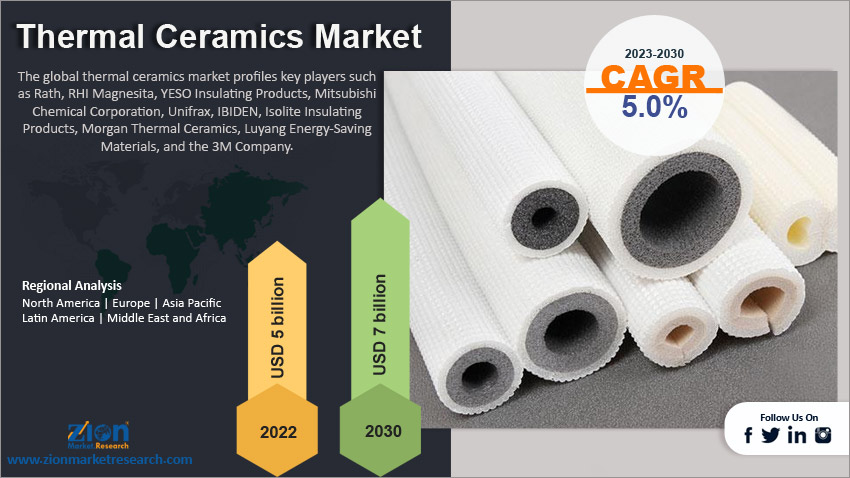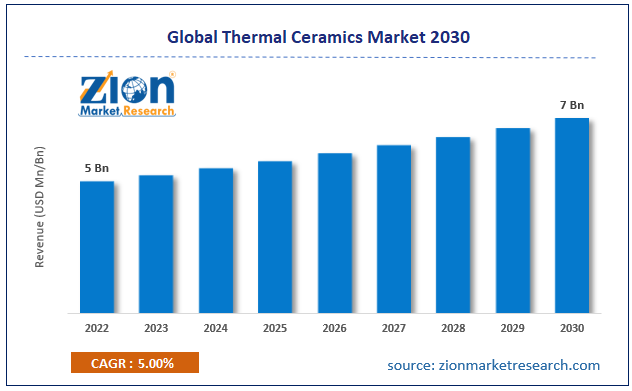Thermal Ceramics Market Size Report, Share, Industry Analysis, Growth, 2030

Thermal Ceramics Market - By End-User (Chemical & Petrochemical, Mining & Metal Processing, Power Generation, and Manufacturing), By Type (Insulation Bricks and Ceramic Fibers), and By Region - Global and Regional Industry Overview, Market Intelligence, Comprehensive Analysis, Historical Data, and Forecasts 2023 - 2030
| Market Size in 2022 | Market Forecast in 2030 | CAGR (in %) | Base Year |
|---|---|---|---|
| USD 5 Billion | USD 7 Billion | 5% | 2022 |
Thermal Ceramics Industry Prospective:
The global thermal ceramics market size was evaluated at $5 billion in 2022 and is slated to hit $7 billion by the end of 2030 with a CAGR of nearly 5% between 2023 and 2030.
Thermal Ceramics Market: Overview
Thermal ceramics assist in the reduction of power usage as well as power emission in myriad kinds of power generation applications. The varied thermal features of ceramic substances play a key role in design considerations including heat conduction, thermal shock resistance, optimum service temperature, heat expansion, and thermal capacity. Growing demand for energy conservation and green building constructions has translated into a huge demand for thermal ceramics in recent times.
Moreover, thermal ceramics are produced through a combination of many types of insulation materials including kaowool. As a result, the subsequent products provide laudable features of thermal insulation for a plethora of sectors.
Key Insights
- As per the analysis shared by our research analyst, the global thermal ceramics market is projected to expand annually at the annual growth rate of around 5% over the forecast timespan (2023-2030)
- In terms of revenue, the global thermal ceramics market size was evaluated at nearly $5 billion in 2022 and is expected to reach $7 billion by 2030.
- The global thermal ceramics market is anticipated to grow rapidly over the forecast timeline owing to escalating ecological concerns that have forced the government to implement strict regulations in construction activities and this has resulted in a humungous demand for environment-friendly materials like thermal ceramics.
- In terms of end-users, the mining & metal processing segment is slated to register the highest CAGR over the forecast period.
- Based on type, the ceramic fibers segment is slated to dominate the segmental expansion over the period from 2023 to 2030
- Region-wise, the Asia-Pacific thermal ceramics industry is projected to register the fastest CAGR during the assessment timeline.
 Request Free Sample
Request Free Sample
Thermal Ceramics Market: Growth Factors
A notable rise in the power generation in emerging economies of APAC and LATAM boosted the global market trends
A surge in power generation activities across developing countries is likely to steer the growth of the global thermal ceramics market over the forecast timeline. Escalating ecological concerns have forced the government to implement strict regulations in construction activities and this has resulted in a humungous demand for environment-friendly materials like thermal ceramics.
Moreover, large-scale applications of the product in process heaters, ceramic kilns, and high-temperature filtration products will embellish the business growth over the forecast timeline. In addition to this, thermal ceramics is used in myriad industries due to its lightweight, low heat conduction features, enhanced flexibility, and wide temperature range. Apparently, the product also finds extensive applications in glass, petrochemicals, aluminum, and ceramics. All these aforementioned aspects will enunciate the growth of the thermal ceramics market over the next couple of years.
Thermal Ceramics Market: Restraints
The toxic nature of the product can put brakes on the global industry over the coming years
The carcinogenic nature of thermal ceramics can prove to be detrimental to the expansion of the global thermal ceramics industry. Huge raw material costs and supply chain disruptions can deter the growth of the industry across the globe in the forecasting years.
Thermal Ceramics Market: Opportunities
Swift Infrastructural growth to open new growth avenues for the global market over the forecast period
Rapid infrastructural growth in the developing countries of Asia-Pacific along with surging demand for products such as high-temperature insulation materials used in lining furnaces as well as industrial heaters will open new growth avenues for the global thermal ceramics market. Apart from this, escalating demand for metal processing and mining will steer the global market trends. Furthermore, the need for low bio-persistent substances along with a surging requirement for refractory recycling will open new avenues of growth for the market globally.
Thermal Ceramics Market: Challenges
Stringent legislation about the utility of products across various end-use sectors proves a huge challenge for the global industry over the forecast period
Strict government laws pertaining to the use of thermal ceramics owing to their toxic nature can prove to be a huge challenge for the global thermal ceramics industry expansion.
Thermal Ceramics Market: Segmentation
The global thermal ceramics market is sectored into end-user, type, and region.
In end-user terms, the thermal ceramics market globally is bifurcated into chemical & petrochemical, mining & metal processing, power generation, and manufacturing segments. Furthermore, the mining & metal processing segment, which accumulated nearly 90% of the global market revenue in 2022, is anticipated to register the fastest rate of annual growth over the forecast timespan. The expansion of the segment during 2023-2030 can be due to the immense demand for products in metal processing & production. In addition to this, an increase in the demand for thermal ceramics in furnaces and kilns will steer the segmental surge.
Based on the type, the thermal ceramics industry across the globe is sectored into insulation bricks and ceramic fibers segments. Furthermore, the ceramic fibers segment, which gathered nearly half of the global industry revenue in 2022, is anticipated to dominate the global industry size over the forecast timespan. The expansion of the segment during 2023-2030 can be due to their low thermal conduction, lower density, reduced thermal inertia, and outstanding temperature control in the insulating surface. In addition to this, their chemical stability and flexibility will boost the segmental surge in the years ahead.
Thermal Ceramics Market: Report Scope
| Report Attributes | Report Details |
|---|---|
| Report Name | Thermal Ceramics Market |
| Market Size in 2022 | USD 5 Billion |
| Market Forecast in 2030 | USD 7 Billion |
| Growth Rate | CAGR of 5% |
| Number of Pages | 218 |
| Key Companies Covered | Rath, RHI Magnesita, YESO Insulating Products, Mitsubishi Chemical Corporation, Unifrax, IBIDEN, Isolite Insulating Products, Morgan Thermal Ceramics, Luyang Energy-Saving Materials, the 3M Company, and others. |
| Segments Covered | By End-User, By Type, and By Region |
| Regions Covered | North America, Europe, Asia Pacific (APAC), Latin America, Middle East, and Africa (MEA) |
| Base Year | 2022 |
| Historical Year | 2017 to 2021 |
| Forecast Year | 2023 - 2030 |
| Customization Scope | Avail customized purchase options to meet your exact research needs. Request For Customization |
Thermal Ceramics Market: Regional Insights
North America is predicted to retain its leading position in the global thermal ceramics market over the forecast timeframe
North America, which contributed about two-thirds of the global thermal ceramics market revenue in 2022, is likely to be a leading region over the forecast timeline. Moreover, the regional market expansion over the forecasting years can be subject to the huge presence of key players in countries such as the U.S. and Canada.
The Asia-Pacific thermal ceramics industry is set to record the fastest CAGR in the next couple of years. The growth of the industry in the sub-continent over the forecast timeframe can be attributed to thriving chemical as well as petrochemical sectors in countries such as Thailand, India, Indonesia, and China. Apart from this, the large-scale need for the product in thermal insulation activities will further steer the regional industry trends.
Key Developments
- In 2022, The CeramTec Group, a key producer of ceramic products, launched AIN HP, a new high-performing substrate that has excellent heat conduction and is utilized in power converters.
Thermal Ceramics Market: Competitive Space
The global thermal ceramics market profiles key players such as:
- Rath
- RHI Magnesita
- YESO Insulating Products
- Mitsubishi Chemical Corporation
- Unifrax
- IBIDEN
- Isolite Insulating Products
- Morgan Thermal Ceramics
- Luyang Energy-Saving Materials
- the 3M Company
The global thermal ceramics market is segmented as follows:
By End-User
- Chemical & Petrochemical
- Mining & Metal Processing
- Power Generation
- Manufacturing
By Type
- Insulation Bricks
- Ceramic Fibers
By Region
- North America
- The U.S.
- Canada
- Europe
- France
- The UK
- Spain
- Germany
- Italy
- Rest of Europe
- Asia Pacific
- China
- Japan
- India
- South Korea
- Southeast Asia
- Rest of Asia Pacific
- Latin America
- Brazil
- Mexico
- Rest of Latin America
- Middle East & Africa
- GCC
- South Africa
- Rest of Middle East & Africa
Table Of Content
Methodology
FrequentlyAsked Questions
Thermal ceramics assist in the reduction of power usage as well as power emission in myriad kinds of power generation applications. The varied thermal features of ceramic substances play a key role in design considerations including heat conduction, thermal shock resistance, optimum service temperature, heat expansion, and thermal capacity.
The global thermal ceramics market growth over forecast period can be owing to the rise in the product use in myriad end-use sectors due to their lightweight, low heat conduction features, enhanced flexibility, and wide temperature range.
According to a study, the global thermal ceramics industry size was $5 billion in 2022 and is projected to reach $7 billion by the end of 2030.
The global thermal ceramics market is anticipated to record a CAGR of nearly 5% from 2023 to 2030.
The Asia-Pacific thermal ceramics industry is set to register the fastest CAGR over the forecasting timeline can be owing to thriving chemical as well as petrochemical sectors in countries such as Thailand, India, Indonesia, and China. Apart from this, the large-scale need for the product in thermal insulation activities will further steer the regional industry trends.
The global thermal ceramics market is led by players such as Rath, RHI Magnesita, YESO Insulating Products, Mitsubishi Chemical Corporation, Unifrax, IBIDEN, Isolite Insulating Products, Morgan Thermal Ceramics, Luyang Energy-Saving Materials, and The 3M Company.
The global thermal ceramics market report covers the geographical market along with a comprehensive competitive landscape analysis. It also includes cash flow analysis, profit ratio analysis, market basket analysis, market attractiveness analysis, sentiment analysis, PESTEL analysis, trend analysis, SWOT analysis, trade area analysis, demand & supply analysis, Porter’s five force analysis, and value chain analysis.
RelatedNews
HappyClients
Zion Market Research
Tel: +1 (302) 444-0166
USA/Canada Toll Free No.+1 (855) 465-4651
3rd Floor,
Mrunal Paradise, Opp Maharaja Hotel,
Pimple Gurav, Pune 411061,
Maharashtra, India
Phone No +91 7768 006 007, +91 7768 006 008
US OFFICE NO +1 (302) 444-0166
US/CAN TOLL FREE +1 (855) 465-4651
Email: sales@zionmarketresearch.com
We have secured system to process your transaction.
Our support available to help you 24 hours a day, five days a week.
Monday - Friday: 9AM - 6PM
Saturday - Sunday: Closed






